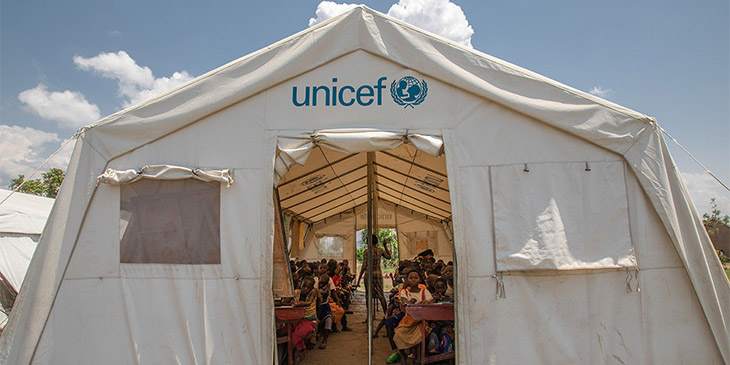20 January 2020

An ambitious partnership aims to help millions of children and youth facing barriers to learning because of poverty, discrimination, conflict and disaster.
Education experts from Cambridge University Press, Cambridge Assessment and the University of Cambridge have joined forces with UNICEF and Microsoft Corp. to launch the Learning Passport.
This will see teachers around the globe given access to a cloud-based learning and skilling platform, powered by Microsoft Community Training, which will provide support to deliver learning materials in the most effective way. It will also track what has been learned, so that children and youth have a digital record of their progress that is accessible anywhere in the world.
The platform will be underpinned by curriculum frameworks developed in Cambridge to cover maths, science and literacy. In addition, a specially-developed programme has been designed to meet children’s social and emotional learning needs.
Building on decades of work in the field by dedicated organisations and individuals, these frameworks and materials can be adapted to meet local needs and circumstances and so provide strong support to teaching efforts – whether in schools, or in the camps that host some of the 30 million children and youth currently displaced from their homes.
This partnership is an embodiment of the University’s mission to contribute to society through the pursuit of education, learning and research at the highest international levels of excellence.
Allied with UNICEF’s deep understanding of how to support children and youth in need and Microsoft’s substantial technological capability, the aim is to close the ‘learning poverty gap’ that sees millions of children fail to reach minimum levels in their education.
The project, led by UNICEF and in collaboration with Microsoft and the Cambridge partners, draws on the best of what is known about delivering effective education and tailors it to the needs of vulnerable children and youth, ensuring they have access to a high-quality, basic education whatever their circumstances and wherever they are.
Jane Mann, Managing Director for the Cambridge Partnership for Education, said: “Imagine that your child is one of those affected by learning poverty. Perhaps they are one of the 30 million currently displaced around the world. How are they going to get an education? What can be done to make sure their future is better than their present?
“When children lose their homes, they lose much more than the roof over their heads; they often also lose their access to education, and we know that education is the most powerful long-term solution to poverty, to conflict, and many of the issues facing the world today.”
She added: “The Learning Passport will help keep children’s education alive while they cannot access anything else, allow their achievements to be benchmarked and so help them to move more smoothly into formal education when this becomes a possibility.”
The announcement coincides with the Education World Forum (EWF) – an annual gathering of global education ministers and experts in London – where the partnership will unveil a report outlining its research and recommendations for the project.
Robert Jenkins, UNICEF’s Chief, Education and Associate Director, Programme Division, will deliver a keynote speech at the EWF on what can be done to address the global learning crisis.
He said: “The barriers some children face are great. Millions are not realizing their right to education, nor realizing their opportunity to develop and succeed.
“Factors affecting success are all too well known. They include family economic status, gender or geographic location, ability and disability and language spoken. Today, globally, nine percent of primary school-aged children are out of school.”
He added: “We must work in partnership – children and youth’s needs go well beyond the capacity of any single organization to resolve.”
Professor Stephen Toope, Vice-Chancellor of the University of Cambridge, said: “We are excited about helping to address this deeply important challenge.
“This partnership is an embodiment of the University’s mission to contribute to society through the pursuit of education, learning and research at the highest international levels of excellence. Cambridge delivers daringly original solutions that help the world, bringing together those who share our passionate curiosity, wherever they come from and whoever they are.
“UNICEF is the ideal lead partner for Cambridge in this endeavour and we are looking forward to continue working with both them and Microsoft.”
Photo credit: © UNICEF/UNI217916/Abdul